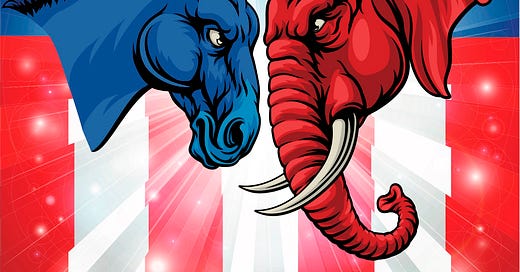On Georgetown’s politically charged campus, it is unsurprising there was a mock presidential debate.
On October 24, students from the Georgetown University College Democrats (GUCD) and the Georgetown University College Republicans (GUCR) steamed their suits and dawned the stage in the International Cultural Center for this mock-presidential debate.
The audience was divided both physically and ideologically. The Democratic student section was packed to the left, and the Republicans were sporadically seated on the right. Throughout the debate, there was cheering, there was jeering and there was booing. Moderators brought up several critical issues: the housing crisis, battling inflation, foreign conflict and gun control.
The first topic on the agenda was the housing crisis, which Georgetown students feel acutely when trying to find an off-campus housing alternative—the options being either a shoebox for $2,000 a month or cramming in with six other roommates.
The Democrats opened with Harris’ plan, which includes subsidizing first-time buyers’ down payments, breaking up home-owning (development corporation) monopolies and outlawing price fixing by corporations. This action plan is outlined by the National Housing Conference and has received widespread attention, even by historically right-leaning media outlets like Fox 8.
The Republican rebuttal emphasized letting the free market work, lowering interest rates and also partially blaming illegal immigrants for the housing crisis. Although the Republican debater did not directly expand on the last point, according to J.D. Vance, “millions of immigrants compete with Americans for scarce homes,” which the Republicans claim drives up competition.
There were notable attempts at bipartisanship, such as GUCR stating, “No one candidate has done 100% horrible things. All Americans, whether they’re black, white, Hispanic or Asian, deserve to be able to live wherever they want and be able to afford that housing.”
None of the participants disagreed that people should live somewhere and afford it. The housing debate then devolved into mutual accusations of only having prewritten talking points and no concrete solutions.
A surprise question from the moderators asked what steps the two parties have taken to combat inflation. Even though inflation is a concern among all Americans, it increased 2.5% from September 2023 to September 2024, which is 0.1% lower than the year before.
The Democratic debater spoke on Harris’ economic agenda and argued that Trump's plans would reignite inflation by lowering taxes since import tariffs he proposes would make many foreign goods unaffordable to the average consumer.
High tariffs on foreign goods harm the average citizen by involving the U.S. in price wars and destabilizing global trade agreements.
According to The White House, “large-scale tariffs result in significant declines in domestic output and productivity,” and many other issues that raise prices and inflation. The Democratic representative also discussed how Nobel prize-winning economics experts support Harris’ plans.
The Republican opponent countered, stating, “If Kamala knows that inflation is too high, why has she proposed absolutely nothing in the last 1379 days to actually combat it? They promised to build back better and all they have built is better excuses on why they haven’t done anything.”
The debate fell into chaos when GUCR was asked about the problem of disinformation and how to combat it.
Disinformation has become a prevalent issue on popular social media platforms and has contributed to discontent and a lack of trust in institutions in the U.S. In response, the Republican debater pointed out that the GUCD Instagram blocked The Philonomosian Society’s Instagram.
Just like any other politically polarizing event, gun control sparked passionate responses from both sides. The Democrats argued for background checks, longer waiting periods, banning assault rifles, permit requirements, red flag laws and repealing gun industry immunity.
On the other hand, the Republicans stated, “The national psyche of our zeitgeist is really broken,” shifting the focus away from the Second Amendment and towards a generalization that increases in mass shootings is a reflection of Americans being less happy.
Another Republican point echoed was that mass shootings are committed by unregistered firearms and that it is the GOP’s priority to “introduce mental health plans” and “commonsense mental health reform” – in essence, the real problem is mental health and not gun control.
The final topic discussed was Russia’s war in Ukraine. GUCD opened by pointing out that the U.S. has supplied Ukraine with weapons, preserving Ukrainian sovereignty and protecting its neighbors because Russian President Putin will not stop at just conquering Ukraine. His potential threat to the rest of Europe has been repeatedly voiced, especially by Polish government officials who fear being the next target.
The main argument from the GUCR opponent was that no new wars started under the Trump administration. GUCR did not address whether or not a hypothetical second Trump administration would continue to send aid to Ukraine. The Republican debater also stated that the U.S. would be taken less seriously if Harris becomes president, although Trump is perceived as the least respected world leader, especially by the U.S.’ European allies.
The Democrat vs. Republican debate, organized by the Georgetown Bipartisan Coalition, authentically reflected the tactics of both sides. Democrats focused on future plan proposals and Republicans argued past achievements of the previous Republican president.
Although, at times, the arguments from the representatives did sound like prewritten talking points rather than on-the-spot responses, that shows their dedication and preparation for the serious nature of a very tense election. On such a politically charged campus as Georgetown, both parties had a platform to be heard and echo core values that the student body could listen to from their peers.
Both sides made a valiant effort and attempted bipartisanship. However, given the hyper-polarization of politics today and the lack of civility, it is unsurprising that much of the debate involved personal attacks and hecklers in the audience.





